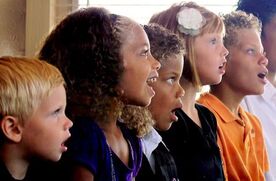
The Children's Musicals director in me wanted to assure her that our program would be worth ATTENDING. And yet, she gave me pause to reflect on the reasons older people may not appreciate the children's efforts.
1. The first reason she said was that she had trouble hearing and understanding what the children were saying. "The kids don't speak up and they are so hard to follow."
2. She also said that the children are so unmanageable and unruly on the stand. "The kids are so irreverent that watching them is too distracting."
3. "Their singing is atrocious! And the singing lady and her posters always block the view!" Apparently, hearing the previous Primaries singing was less than pleasing for this poor lady.
4. "I get nothing out of it!" Well, given her trouble hearing and following along, I can guess she would get nothing out of the children's presentation.
So, we in the presidency counseled together trying to address these points hoping we could do better.
1. First of all, we worked very hard to plan the program long enough in advance that the children were well prepared. All of them got the chance to memorize their parts, practice at the microphone, and take their turns in an orderly fashion.
2. We only brought the youngest children up onto the stand for a few parts, and all their movement was underscored with music. The older children could sit on the stand more reverently.
3. We absolutely insisted that the children had the songs completely memorized. The director had no need of large posters or flip charts. We practiced stage deportment, sitting and standing on cue, and looking only at the music director during songs. (I have to admit that their singing was quite good because they were so well prepared.)
4. We encouraged the children to understand how their songs and words were of no value to the congregation unless we invited the Spirit to be with us all. The Holy Ghost would help us present our messages well and also help the people understand us if we invited His help.
Sometimes, in the effort to make a good "show," well-meaning Primary workers try to include too much, or don't prepare in the most optimum ways. Examples of "too much" may be using sign language for a very long song, having little children hold up pictures, and giving out a lot of solo singing or instrumental parts (creating added commotion getting to and from the microphones). All of these ideas, exciting as they potentially seem, from the audience's perspective, slow the "flow" and create visual chaos.
About using sign language, in the eyes of the uninitiated grandparent observers, the signs are practically meaningless. So unless the movements are slow and flow beautifully like a dance, they are distracting. Besides, many of the children aren't coordinated enough to sign and sing at the same time. Insisting on teaching all of those signs may also usurp valuable practice time that could be used for more important things.
Being aware of who will be in the audience and their needs should always be taken into consideration when planning the Primary Presentation. You don't want to be approached by people letting you know that they want to be sure to miss your Primary Presentation!
 RSS Feed
RSS Feed